Peter MALONE
Saturday, 09 October 2021 13:00
Police/ 2020
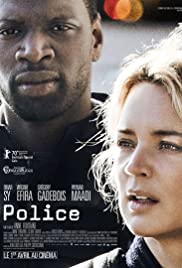
POLICE
France, 2020, 100 minutes, Colour.
Omar Sy, Virginie Elfire, Gregory Gadebois, Payman Maadi.
Directed by Anne Fontaine.
A French film with the title Police might expect to be a tough action show – and there have been many. This one is rather different insofar as it is set in a local Paris precinct, rather low-key compared with officers, charged with dealing with a lesser, investigating terrorism…
And the central character is female, Virginie a married officer played by Virginie Elfira, mother of a child, tensions with her husband, different tensions with the various men in the precinct. And, with this emphasis, it is significant that the film was directed by Anne Fontaine, not a director known for action films but rather studies of relationships and a portrait of Coco Chanel.
The two supporting characters are male. The ever-genial Omar Sy gives the appearance of being self-assured but is also self-conscious about his origins in Senegal. And has taken advantage of his relationship with Virginie. The other supporting character is Eric, a veteran of 20 years, straight up-and-down, letter of the law, but feeling the pressure and also alienated from his wife despite his best efforts.
We are shown the three involved in three cases, one of domestic violence, a wife still loving her husband but treated brutally by him – and his brutally treating Virginie when she comes with the investigating team. The group also has to go out to quell a city riot.
The main task is to accompany a refugee held in a detention centre who is to be deported. The three take him to the airport and questions are raised as to the justice of his deportation, an attempt to help him even escape but he cowers in the back of the car thinking the police are going to kill him. There is an extreme of the ultimate solution – symbolising a protest against harsh detention regulations.
At the back of all this action is an abortion issue.
A police film with a difference.
1. The title? Expectations? Differences from expectations?
2. The city of Paris, the precincts, homes, streets, the riots, domestic violence, airport, countryside, the sea, the abortion clinic? The classic style score?
3. The highlighting the names of the key characters, the focus on each, their interactions?
4. Virginie, the baby waking her, her relationship with her husband, careless at home, putting on her uniform, the policewoman, the fellow officers, the variety of jobs? Her age, experience, competence? The visit to the abortion clinic? With Aristide? tension? The banter? The flashbacks and the significance of the relationship, the practice fighting, the sexual relationship, the consequences?
5. Aristide, from Africa, his sense of race, his sense of self, his jokes? The flashbacks, with Virginie? Learning about the abortion, the effect, offering to go with her – and eventually going?
6. Eric, 20 years on the force, obeying the rules, rigid personality, sense of duty, the clashes with Virginie and Aristide, the phone calls from his wife, the massage experience, her changing the locks, his standing by the sea, will he kill himself or not?
7. The cases, the experience of the home violence, the wife at the precinct, loving her husband, going to the home, his gross attitude towards Virginie, the police, overcoming him? The riots, the action, the arrests?
8. The fire at the detention centre, the police going, the refugee to be deported, going to the airport, the news about the appeal to the courts, the tension in the car, each of the police and their attitudes towards the refugee? The possibility for escape? The stopping, the man afraid, thinking he would be killed? Giving him food? Eric and his complaint? Going to the airport, Virginie upset, the plan, talking to the pilot, letting the refugee out?
9. The visit to the abortion clinic?
10. The final close-up on each of the three police?
Published in Movie Reviews
Published in
Movie Reviews
Saturday, 09 October 2021 13:00
Profugo, Il/ The Intruder
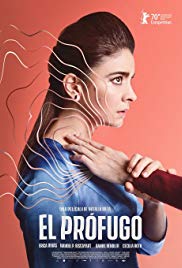
IL PROFUGO/THE INTRUDER
Argentina, 2020, 91 minutes, Colour.
Erica Reeve us, Daniel Hendler, Cecilia Roth, Nahuel Peres Biscayart, Agustin Rittano.
Directed by Natalia Meta.
A drama with touches of horror from Argentina. The film focuses on a middle-aged woman, Ines, involved in dubbing horror films into Spanish, in a testy relationship with her mother, teaming up with a boyfriend. But, we discover she has many dreams. Is apprehensive. Dreams that a flight attendant on the plane is offering to murder her boyfriend. And when they explore deep caves, she is terrified, over-terrified by the bats.
The title refers to, as an expert explains, sounds which can invade a person’s consciousness and being.
Ines also sings in a choir with intruder repercussions for her voice. It also affects her as she goes through her dubbing. It also has some dire violent consequences with her boyfriend and a mystery with the organ tuner who falls in love with her.
She seeks psychological help. Is both helped and criticised by her mother. Another actress explains her situation. And the dubbing expert also becomes involved in helping her to return to normal.
This review, perhaps, is clearer in its explanation of some of the events and characters than in the actual film itself.
1. Title? The sounds and noises? The effect on people? Techniques to be rid of them?
2. The Argentinian setting, apartments, hotels, the concert hall? The dubbing studios? The caves, the holiday hotel? The musical score? The classic performances? The women singing?
3. Ines’s story? Her age, background, her relationship with her mother, her mother intruding? Her relationship with Leopoldo? In the plane, her dreams and nerves, the flight attendant offering to kill? In the cave, the bats and her fear? In the hotel, Leopoldo irritating? Locking him out? Finding him dead? The introduction to the theme of noise, the intruders?
4. Her work as a dubbing actor, the horror films, her performances, Nelson and the technology? The atmosphere of horror? Her singing in the choir, her voice, the conductor, moving her?
5. At the dubbing studio, the intruding sounds, Nelson and his concern, those involved with the technology? Ines and her concern? The oral effects? The actress, her theory of intruders, the effect on Ines?
6. The range of dreams, the horror touches, her explanations? The discussion with the scientists, her being tested?
7. The lying down with Nelson? His disappearance? The effect on her? The double appearance of her mother and her not-mother? Consulting the actress who could not help?
8. The organ, Albert, his friendship, trying to help, younger than Ines, the organ playing, her suspicions, and intruder?
9. Getting rid of the intruders, performing in the choir, seemingly healed, the exuberance of the final song?
10. Enigmatic? Puzzle? For audiences to solve?
Published in Movie Reviews
Published in
Movie Reviews
Saturday, 09 October 2021 13:00
Roads Not Taken, The
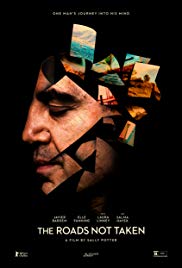
THE ROADS NOT TAKEN
UK/US, 2020, 85 minutes, Colour.
Javier Bardem, Elle Fanning, Branka Katic, Salma Hayek, Laura Linney.
Directed by Sally Potter.
Sally Potter has written and directed some striking independent films, often small-budget, for over 30 years. (She also writes the musical score and performs on the keyboard.)
Usually her films are set in England. This one has a New York setting (although British backing, including BBC films). The cast is also international.
The action takes place over one day, focusing on Leo (Javier Bardem) who lives in a somewhat dingy apartment, close to the overhead subway, the passing trains seeming almost to enter into his room. It appears also that he is confused. And that theme is continued strongly throughout the day. To that extent it is a sad day for him. But it will be even sadder.
On the one hand, his daughter Molly (Elle Fanning) is taking time off work to take him to the dentist and to the optometrist. Those visits ‘n in disaster for the bewildered Leo, afraid of the dentist and wetting himself, the need to go to a shop to get new trousers, but his habit of wandering off on his own causing all kinds of problems. And, when he suddenly gets out of the car driving along the New York Street, he finishes up in Emergency.
Details of his life gradually emerge, especially a visit in the hospital from his ex-wife, played by Laura Linney.
But, the drama is complex because of the flashbacks. It is hard to gauge whether the flashbacks show what actually happened or are a part of his confused memories. The memories go back to Mexico, to his relationship with Dolores (Selma Hayek) and a story of a little boy killed in a car accident, sad memories, guilt memories. On the other hand, there are flashbacks to Leo’s life as a writer, in Greece, meeting a group of young tourists, asking them about happy and sad ending a s, rowing boat towards the yacht… And so the question is: is this real or part of his literary fantasy.
And so, the title is a challenge, the roads taken, the opportunities avoided, lost, missed.
Molly has been devoted to her father even though he has been a very little part of her life. At the end, she has to make a decision, a road taken, a road not taken.
1. The work of the director, career, female perspective, small independent films? The backing for this film, British backing, BBC, filmed in the US?
2. The title, the themes? As applied to Leo? And the end for Molly?
3. The action taking place over one day, the significance of the flashbacks? Actual events? Hallucinations? The musical score, orchestral, the piano?
4. A portrait of Leo? In the room with the sound of the subway, his refusing to answer the phone, the door? Lying immobile? Molly and her phone calls, coming to see her father? The maid and her working, caring for Leo, vacuuming and waking him up? Molly and her intentions for the day, the dentist, the optometrist? Phoning into work and saying she would be late?
5. The beginnings of the flashbacks, Leo and his relationship with Dolores, her love for him, her wanting to leave? The flashback to the truck, his chasing her, getting in? Out, getting the lift back home? The memories of the dog, Nestor, the photo, his continual talking about Nestor, talking to him?
6. The significance of Dolores, the son, not picked up from school, the accident, Leo’s guilt, regrets, fostering them all his life? The visit to the cemetery, the hallucination, the meeting with Dolores, his confession and explanations?
7. Molly, her devotion to her father, in English, in Spanish? The difficulties in getting ready, going out, the taxi? The visit to the dentist, Leo and his unwillingness? Wetting his trousers, Molly and changing the trousers? Giving her own? When shopping, his wandering? In the car, his hallucinations, getting out of the car, the injury, the ambulance, in emergency, physically all right, mentally not, the diagnosis about his brain?
8. Leo, his age, his appearance, and looking the same age in the flashbacks? His mental state, loss of memory, in and out of memories, recognising Rita, naming Dolores, Molly staying with him, going out in the night, his wandering the city barefoot, the context for memories, finally meeting the Middle East on men, their concern, the police, bringing him home?
9. Molly and are calling her mother, Rita and her relationship with Leo, the marriage, the daughter, the divorce? The remaining “friends�? Rita and her insistence, concern about Molly, offering to help?
10. Molly and her losing her job?
11. The memories of Greece, his trying to write, leaving his daughter behind? The young women, the friendly one and talking about the ending of novels? The other one angry? Comment that he gave up his daughter for a book? Their paddling, going to the boat, the party and dancing? Leo and his taking the boat, rowing out, the yacht leaving, his being found drifting and rescued?
12. Finally at home, his mental state? Molly and her offer of care?
13. The title, Leo and the various roads taken and not taken? And for Molly at the end, saying she would care for him, but having to travel and write, her professional work? And the symbolism at the end of Molly’s choice of staying with her father on the bed and the other choice of her leaving and going out the door? Taking that road?
Published in Movie Reviews
Published in
Movie Reviews
Saturday, 09 October 2021 13:00
Rizi/ Days
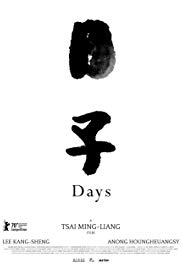
RIZI/ DAYS
Taiwan, 2020, 127 minutes, Colour.
Kang-sheng Lee, Anong Houngheuangsy.
Directed byTsai Ming Liang
At the beginning of the film it is stated that there are no subtitles, intentionally. As the film progresses, they are not needed.
The director has made a number of films but is also interested in virtual reality. This is a very evident in the cinematic style, the succession of takes, the length of the takes, the equivalent of either paintings in an art gallery or visual sequences for an installation. To that extent, the film is for connoisseurs of art, for those interested in extending the bounds of cinema.
It can be said that with this kind of film, the director has control of the audience if they are willing to stay. With an art gallery or with a museum and installations, how much time and attention is given to each picture or sequence is the choice of the audience, to stay, to move on, to exit. This is not possible with a film like Days when the audience opts to stay.
The director had established a reputation in the 1990s, winning awards with the l’Amour and Goodbye, Dragon In. There was more sexual emphasis in consequent films, pornography in The Wayward Cloud, 2005, and I Don’t Want to Sleep Alone, filmed in Malaysia, 2007.
The film opens with long takes focusing on two men. There are some glimpses of outside scenery throughout the film but most of the segments are interiors or local streets. There is long sequence, for instance, of the preparation and making of a meal.
The director has always been interested in sexuality, in sexual orientation, in gay encounters between men. Days has what may be the longest sequence of erotic massage, an intensity of focus.
To the extent that there is a focus on the two men, there is some kind of narrative – but with the final images, there is a long close-up of the older man sleeping and then on his face, awake. Whereas the masseur Since on a bench in the street and, eventually, moves on. Significant it is a gift that the older man makes to the younger, a small music box which contains Charles Chaplin’s theme from Limelight – I’ll be loving you eternally, repeated over and over.
The word eternally reminds the audience that watching a film like this over two hours is also an experiment in the observation of time, time passing, the effect of time.
Literally an arthouse film experience.
Published in Movie Reviews
Published in
Movie Reviews
Saturday, 09 October 2021 13:00
Schwesterlein/ Little Sister
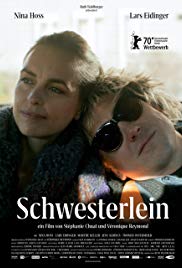
LITTLE SISTER/ SCHWESTERLEIN
Germany, 2020, 99 minutes, Colour.
Nina Hoss, Lars Eidinger, Marthe Keller, Jens Albinus.
Directed by Stephanie Chuat, Veronique Remond.
Nina Hoss is one of the foremost acting talents in Germany over the last decade or more (Barbara, Phoenix, Gold). Lars Eidinter is also a strong emerging talent (appearing as the concentration camp officer in Persian Lessons). The two appear as brother and sister, twins, two minutes difference between them, Lisa been two minutes younger than Sven, and she is the Little Sister.
On the one hand, this is a very interesting drama and highlighting the relationship between brother and sister, the nature of the bonds, each experiencing the others joys and, here, especially their pain and suffering. It also highlights that each twin can become obsessive about the other.
But, this is also a film about terminal cancer. On that level, the film has many moving moments, the physical pain, the need for transplants, the little sister wanting to help her brother and becoming more and more preoccupied with his health, at the expense of her relationship with her husband and children. There are many scenes in hospital, in darkened rooms, in doctor’s offices.
At one stage, Sven comes out of hospital and is taken to stay with their mother, a woman of moods who is not willing to take responsibility for her sick son (Marthe Keller).
Sven, however, is allowed to stay with his sister and her family. They are based in Switzerland where the husband is a teacher with strong responsibilities who is being offered tenure of his position for the next five years. This is a challenge, of course, for Lisa. Does she want to stay in Switzerland for another five years? Is she at home there? Her husband and children at home there? And what of Sven and his illness and the future?
There is a dramatic moment when Sven wants to go hang gliding and does so with his brother-in-law only to have a panic attack, a physical collapse and return to hospital, and a return to Berlin.
So, while the film traces the development of the disease, Sven’s decline, Lisa continues to hope that a theatre director with whom Sven worked for many years, especially in the production of Hamlet, will restage the play. In the meantime, she begins to write a monologue for her brother based on Hansel and Gretel.
There is a further complication for Sven as he is a gay man, frequents gay bars.
The challenge to the audience is how much they identify with Sven and his cancer experience, how much they identify with Lisa and her obsessive loving bond with her brother and her compulsion for care.
1. A contemporary human drama, German drama?
2. The cancer themes? And the theme of bonds between twins?
3. The importance of Berlin, homes and apartments, the locations, the theatre, the streets? The contrast with the Swiss mountains, home, the teaching Institute, the hang gliding? The operatic score? Piano accompaniment?
4. Sven and Lisa, two minutes between them? Lisa as the little sister? Yet her having the stronger personality? The opening, her experiencing the transplant? Sven and his illness, the cancer, the rooms, the response of the doctors? His getting out of hospital, going to their mother? Her fussiness and hesitation? He is wearing the wigs and looking askew? Going to the theatre, meeting the director, their past career with Hamlet, his hopes, the restaging? His being transferred to Switzerland, the episode of the hang gliding and his becoming ill, the dangers? Lisa’s angry reaction? The rejection of the transplant? The director visiting, the decision about not putting on the play? Lisa and her imagining Hansel and Gretel? Writing a play, monologue for Sven? Going to the gay clubs, the sexual encounter? Memories of his past lover, the phone calls? His death?
5. Lisa, strong, writing plays? Interaction with her mother, her mother’s fussiness, the cake, worries at home? Her looking out to Sven’s home, her concern, his gay friend, performing Hamlet, her insistence? Memories of the past, her life in Switzerland, her husband, children, her teaching, the social life, the issue of the five year contract, her wanting to be in Berlin, but her compulsion to save Sven? Writing Hansel and Gretel, her hopes? The director’s visit, her angry outbursts? Martin, taking the job, her stubbornness? Self-preoccupation, especially the bond with Sven? Going back to Berlin, Martin and the children, the phone call about an abduction? Her quietly sitting in the square, the composition, reading it with Sven? Sitting quietly by, his death?
6. Her mother, stories about the father, fidelity and infidelity, fussing, baking, finding it too much? The grandchildren?
7. The director, the past, putting on the play, his decisions, his realism about Sven’s health? Lisa’s attack?
8. The range of doctors, the discussions, the final options?
9. Martin, in himself, a good man, loving Lisa, the children and their identifying with Sven? The issue of the contract? Lisa difficult and intolerant? His going to Berlin, taking the children, bringing them back?
10. The final close-up of her and her face and the audience experiencing her grief?
11. Close-up of Lisa, the audience working out what her future might be?
Published in Movie Reviews
Published in
Movie Reviews
Saturday, 09 October 2021 13:00
Siberia/ 2020
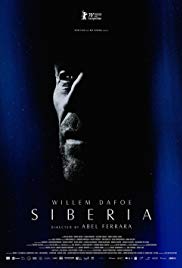
SIBERIA
Italy/Germany, 2019, 92 minutes, Colour.
Willem Dafoe, Simon Mc Burney,
Directed by Abel Ferrara.
Abel Ferrara has been directing offbeat films for 40 years. He started in exploitation. He also had his own personal problems, addictions, religious searching.
By the 1990s, he made some interesting dramas, especially Bad Lieutenant, and The Funeral which won the OCIC award at Venice in 1996.
He has had five collaborations with Willem Dafoe, especially his Pasolini, with Dafoe as the celebrated director at the end of his life.
Siberia is, one might say, at the physical and psychological back of beyond. During the opening credits, Dafoe’s character, Clint, gives a long story about his relationship with his father and hunting. As the film opens, he is in Siberia at a wooden framed cabin, bar, encountering locals in their language, a pregnant woman with her chattering grandmother – with the possibility that Clint is the father of the child.
In extraordinary snow and forest country, the screenplay has Clint going out on something of a personal quest by literally falling down the cliff face which leads to a number of encounters which are surreal rather than real, some hallucinations. He encounters another presence of himself, naked. He has images of his former wife and their clashes. He sees people in a cave looking for salvation, naked people in some kind of collective camp, a strange seeming mystic (Simon McBurney) along with sequences in burning sand desert, member of his father, some dancing to the song, Runaway, achievable and colourful dancing around a maypole.
Is he looking for the meaning of life, the essence of existence? Is in plagued by guilt and the need for redemption? Why does he have these kinds of hallucinations? Ferrara doesn’t offer many answers or even clues to answers, just presenting the characters, images, symbols for the audience to contemplate. Which may be far more than most audiences are prepared to contemplate or value.
Screened in Berlinale, 2020. Some of the reviewers were far more eloquent than this particular review, relishing their opportunities for creative language and their comments.
Guy Lodge, Variety: “Siberia, a beautiful and unhinged, sometimes hilarious trek into geographical and psychological wilderness that will delight some and mystify many others.…
… Situating view was firmly inside Clint’s already detached headspace.
Those who require a standard A-to-B narrative would be best advised to check out at an early stage.
… Give way to disconnected sites of memory, fantasy and nightmare: phases of actual forgotten dreams, caramel expanses of distinctly un-Siberian desert, an abandoned Russian death camp, a spring garden adorned by a pastel maypole
Deborah Young, Screen: Abel Ferrara’s stream of consciousness experiment. The screenplay pinball’s between oblique grotesque shock tactics and incoherent indulgence.
Pursuing a cinema of sensation agenda is all very well, there should be a kernel of honesty and meaning in the film, or it just looks like the Instagram feed of a well-travelled psychopath.
“Your reason is an obstacle�, announces the magician, which sounds a lot like Ferrara giving himself licensed to do whatever he feels like doing, while plundering his central character’s subconscious the images that are arresting, frequently unsettling, but mean very little when strung together.
Published in Movie Reviews
Published in
Movie Reviews
Saturday, 09 October 2021 13:00
Suk Suk
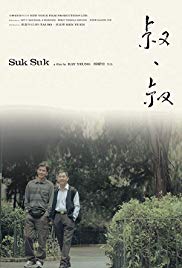
SUK SUK
Kong, 2019, 92 minutes, Colour.
Tai-Bo?, Ben Yuen.
Directed by Rey Seung.
Suk Suk is an elderly man meticulously washing and cleaning his car. He is a taxi driver in Hong Kong. He is 70, married with son and daughter, appreciating but often off-hand with his wife, delighting in his granddaughter. But, there is much more to his character and personality.
This is a Hong Kong story about gay men who had to conceal their orientation for many decades, marry, have families, survive and give the impression of ordinariness in their lives.
The audience may be surprised to discover the taxi driver’s real life, so well is it initially concealed in the film. But he sees an older man in the park, cruises the park, tries to ingratiate himself – but the other man, who we discover has also married and concealed his orientation, wants friendship before sexual encounters.
The main story then is of the relationship between these two men, their talking about their past and its effect on them, their visits to gay saunas, the beginning of friendship and sexual companionship. In the background are the complications of the next generation, the taxi driver’s daughter getting married, her fiance not being able to afford the wedding banquet (to the disgust of his mother in law), the father not only paying for the celebration but also giving him the lease of the taxi. The other man’s son is rather prim and proper, demandingly politically correct for himself, his wife and daughter, with a Christian background, shared by his father.
And the point for telling this story, politically and socially, is a movement to establish a home for the elderly, full gay elderly men, run by gay staff who respect the men who are able to emerge from their secrecy. We see several meetings and panels with political pleas for establishing the homes.
A sympathetic story of gay men, memories of social treatment in the past, secrecy and cover, the emergence of recognition and acknowledgement in more recent times.
1. Hong Kong story? Characters? Families? Gay issues?
2. The background of the city, the streets, the harbour, homes, clubs? The musical score and the plaintiff background?
3. The introduction to Pak, cleaning his taxi meticulously, picking up his granddaughter, going home, the taken-for-granted relationship with his wife, his son and family, his daughter and fiance? His age, issues of retiring?
4. The introduction of the homosexuality theme? Pak and his cruising, Hoi in the park, wanting to be a friend first? The impact for the audience, the gay man who had married and had a family, a comfortable life at home, work, carrying rice, driving the taxi? Secretiveness?
5. The friend, his background story, unsatisfactory marriage, his meticulous son, protecting his daughter, “politically correct�? Criticisms of his father? The Christian background?
6. The two men, friendship, taxi rides, texting, going to the baths? Their memories of the past? The growing intimacy between them? Covering from their families?
7. The daughter, the fiance, not having enough money for the wedding breakfast, the mother and her criticisms, the father and his encouragement, the celebration? The father giving him the lease, taxi?
8. The companionship between the two men? Their talking and remembering?
9. The old gay men, the issue of the home for gay men, staff, enabling them to be themselves? The group meeting, the discussions, the stories from the past? The final issue of the plea for the home? On the television?
10. A sympathetic plea for the men? Impact for Hong Kong? Beyond Hong Kong?
Published in Movie Reviews
Published in
Movie Reviews
Saturday, 09 October 2021 13:00
There is No Evil/ Sheytan Vojud Nadarad
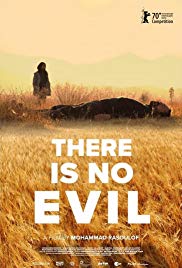
THERE IS NO EVIL/ SHEYTAN VOJUD NADARAD
Iran, 2020, 150 minutes, Colour.
Directed by Mohammad Rasoulof.
A long film but it involves four stories. It won the Golden Bear at the Berlinale, 2020, and also won the prize of the Ecumenical Jury. It is a film well worth seeing.
The title is tantalising. There is certainly plenty of evil in the background – and, at the end of the first story, after about 30 minutes of ordinary domestic life, there is a sudden edit cut which surprises and shocks us – but introduces the theme of the death penalty, the barbaric aspects of executions.
Each story is interesting and well told in itself – and there are some links, especially with the theme of the death penalty.
That first story focuses on an ordinary man, his night shift, coming home, picking up his wife, a teacher who gets irritated with almost everyone, then picking up their little daughter, something of a brat, but their helping the wife’s mother with a meal, cleaning the house, and then they have a trip to the local pizza restaurant. This story settles us into ordinary life in Iran – and then the jolt.
The second story is much more serious, a group of men on military service, stationed in prison, asked to participate in the executions. While some accept this is part of the routine, another one is very law-abiding in his attitudes and accepts what is asked of him as necessary in society. The other young man is rather frantic, not wanting to participate, trying to engineer an escape from the service. There is some tension here as he dangerously makes his way out of the prison.
Then quite a change of atmosphere for the third story, in the rural countryside, but a green countryside, water flowing, a country house, the celebration of a birthday and another young man – on a three day leave from military service, having participated, somewhat reluctantly but accepting it, in an execution. What was to be a happy event turns into a very sad one because of the implications of the execution.
And, finally, for the fourth story, out into the deserts of Iran, mountains and barren countryside. A young woman visits from Germany and an older couple welcome her. But, in the background is a story of secrets and lies, revelations and disappointments, and one of those endings where decisions have to be made, the camera focuses on a car on a desert road, halted. What decision is being made? It is over to us.
In terms of reputation, Iranian films have a solid reputation for dramatising human values. This is certainly one of them.
1. 21st-century Iran? Filmmaking? Storytelling? Memories of the past, interpretations of the present? Critique (and the director forbidden to attend the Berlin Film Festival where it won the Golden Bear)?
2. The perspective on Iran? City life and its detail, the contrast with prison and military service and interiors, the road to escape? The contrast with the fertile countryside, green, water, the mansion? And the final contrast with the desert, the mountains, the house, farm, arid? The cumulative effect? The musical score?
3. The execution theme, the sudden introduction of the theme, the death penalty, facts, hanging, pressing buttons, removing stools under the hanged persons? The acceptance of execution, death penalty, protest, consequences?
4. The first story: the focus on Has known, ordinary middle aged man, the work shift, going to his car, the bag of rice, going home, picking up his wife from school, her continued complaining, the issue of the bank can the salary, her mistakes, her husband’s criticism? Picking up their daughter, cheeky and spoilt, demanding? Going to the mother, at home, caring for her, the groceries, the meal, her health, cleaning the house? Going to the pizza parlour, the daughter tired, carrying her, going home? His working early in the morning, his ship, ordinary, the signals, his pressing the button – and the sudden view of the feet of the hanged men?
5. The second story: the military service, the men, in the prison, the attitude towards the law, the young man who wanted to obey all the rules, the task of execution, military service men not wishing to execute, his becoming more frantic, his escape plan, his girlfriend, the note about the doors, his leaving, going to the office, getting the gun from the guards, putting them in the cupboard, going past security, the continued dangers, getting out, the girlfriend with the car, going into the hills and looking out over the city, freedom?
6. The third of the stories: the celebration of the birthday, the rural setting, pastoral, beekeeping, the green countryside? Javid and his three-day leave (and the revelation that he obtained it because of participating in the execution, especially Keyvan)? Manner, life on the property, her happiness, relationship with her parents, love for Javid? The atmosphere of grief, the musicians arriving in playing, the memorial for Keyvan, everybody speaking so well about him? In education and support? Javid sent his picture, going to the river, upset, nano finding him, his admission what he did, the effect on him, on the?
7. The fourth story: the airport, Darya arriving from Germany, the story of Mansour as her father, her visit, the couple waiting, driving out into the desert, the house, the farm, the threat from the Fox? Her settling in? Discussions and asking questions? Going driving – getting out into the open for her mobile phone calls? The hunt, her refusal to kill the fox? Returning? The man and his health, his past story, doctor, the visitor with the child in his care? His wife, retreating, sculpting? Her telling the truth? The effect on the young woman? A world of lies, re-evaluating her life? Discovery of her father? Anger? His being sick, his wife’s care, support? Her wanting to leave home – and the final scene of the car paused in the desert? The decision?
8. The interlinking of the stories and the theme?
Published in Movie Reviews
Published in
Movie Reviews
Saturday, 09 October 2021 13:00
Undine

UNDINE
Germany, 2019, 92 minutes, Colour.
Paula Beer, Franz Ragowski.
Directed by Christian Petzold.
Hans Christian Andersen created the myth of Ondine, a water spirit. Neil Jordan made an Irish version in 2010, Ondine. This version is set in Germany with the title, Undine.
The director is a prominent German director with such interesting films as Barbara, Phoenix, Transit,.. However, this is not quite in the same league, although its leading actress, Paula Beer, won the Silver Bear as Best Actress at the Berlinale, 2020.
At first meeting, we find that Undine is a rather wilful, even capricious, woman, not only angry at the boyfriend who is breaking up with her but even threatening to kill him. And then she transforms as she goes to her work, at a Museum in Berlin, a historical guide, dealing with an enormous three-dimensional map layout of the city. Berlin is to the fore of the film in many ways, locations, history, spirit.
There is a strange accident in the cafe, an accident with water. Undine encounters an industrial diver, Christophe (Frantz Ragowski) who is very taken with her talks, bumps a large fish tank in the restaurant which breaks and they are overcome with the water. This is a literal breakthrough for Undine and she Christophe enter a relationship which seems to be beneficial for each of them.
Christophe and his partners go to various dams and do underwater repairs. At one stage, Christophe imagines Undine under the water with him. He also finds her name carved on a wall in the water depths.
The film moves into the mythical while keeping to the realist situations. Undine encounters her former boyfriend again, Christophe seeming upset, but is this the case? Is Undine imagining the situation, how does she react when she finds that Christophe has had an accident is in hospital, and then walking into the water. But, there are further emotional complications for Christophe, for his partner, for his obsession with Undine…
The plot is quite strong but, somehow rather, it is not as compelling as it might have been.
1. The title? Hans Christian Andersen? The fairy tale of Undine? Adapted to Germany, 21st century? Realism? Imagination?
2. The Berlin setting, the views of the city, the countryside, the dams and the walls? The underwater photography? The episode with the catfish? The Museum, the layout of the model of Berlin and her explanations?
3. The significance of the descriptions of Berlin? For visitors to the city? The history of the city?
4. The introduction to Undine, attention, the meeting with Johanne, his breaking off with her, her intensity, the threat to kill him? That he should wait for her lecture? The contrast with her changing, the lecture, her efficiency, information, historian? The return and his disappearance?
5. The director drawing on the story of Ondine? From the water, the water creature, needing love from a man forever, destructive elements?
6. In the restaurant, the encounter with Christophe, the accident, the fish tank bursting, the effect on each? The miniature of the diver? The relationship between the two? Falling in love?
7. Christophe, his associates, their underwater work, industrial diver?
8. Christophe and his relationship with Undine? His falling in love? The outings together? The sexual relationship? Her travelling? His travelling and his work? Her work at the Museum, Christophe hearing her, admiring her, wanting to hear her supplementary lecture?
9. On the bridge, passing Johannes? Her looking back? The later phone call? Christophe and the accusation, her heart skipping a beat? Her denials? Her leaving a message on the phone?
10. Johannes, coming to the restaurant again, breaking with Nora? Undine dismissing him?
11. Christophe, underwater, seeing her name carved underwater? His visualising her, the previous swimming together? Her equipment, surfacing?
12. The news of Christophe being brain-dead, her going to the hospital, the associate explaining the time situation? The effect on her? Her walking into the water and disappearing?
13. The moment of Christophe recovering? Going back to work, underwater, the success of his work? His partner pregnant, her waking, following him, his walking into the water? Her appearance?
14. The blend of the realistic and the mythical?
Published in Movie Reviews
Published in
Movie Reviews
Saturday, 09 October 2021 13:00
Welcome to Chechnya
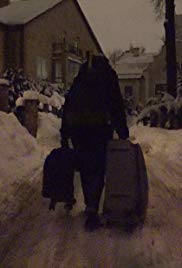
WELCOME TO CHECHNYA
US, 2020, 107 minutes, Colour.
Directed by David France.
This is a documentary distributed by HBO. It is a topical documentary, especially for the latter years of the 2010s.
Chechnya is not on the beaten track for most travellers. It is situated in South Russia, is a Muslim community rather than Christian. It was involved in revolt against Russia and involved in some terrorism.
This is a film about a different kind of terrorism. In the mid-2000s, the president of Chechnya, Ramzan Kadyrov, ho gives an impression of cheerful buffoonery in his public appearances, but is a solid friend of Vladimir Putin, supported by him, started a campaign against homosexuals. The film highlights that this is in the tradition of Stalin and the Third Reich and their persecution of gay men and women.
Homosexuals were sought out, their families urged to denounce them or, even worse, to exercise of violence or kill them. Many were rounded up and subjected to dire torture.
The film was introduced by David Isteev who is in charge of an organisation that helps gay people who approach them, find alternate accommodation which is secret, arrange for them to leave the country and settle elsewhere, many in Canada. He recurs throughout the film, commenting, in action with various men and women, also a social advocate with human rights groups in Moscow. He is aided by Olga Baranova, a sympathetic collaborator who is highly involved in all the activities.
The film naturally focuses on a few people to make the points about the range of men and women who suffer. The central character is aged 30, is supported by his family, has a partner who is giving up prospects for further studies and degrees by coming to live in the commune and, if possible, the pair will migrate. On the other hand, and Olga are contacted by young lesbian 21-year-old who fears for her life with her family, is threatened sexually by her uncle, comes to stay in the commune, is helped but takes the opportunity eventually to disappear.
Inserted into the film are some graphic interludes, scenes of actual torture. Inserted also are meetings between the president and Vladimir Putin, their exercising a common policy.
Finally, the central young man decides to take his issues to court, first of all appearing and giving testimony so that he can file a complaint against the authorities. This of course has some pressure on his family members as well as his partner. Ultimately, his request to file a complaint is briefly and brusquely rejected.
This is a film about human dignity, civil rights, no matter the issues of sexual orientation.
Published in Movie Reviews
Published in
Movie Reviews